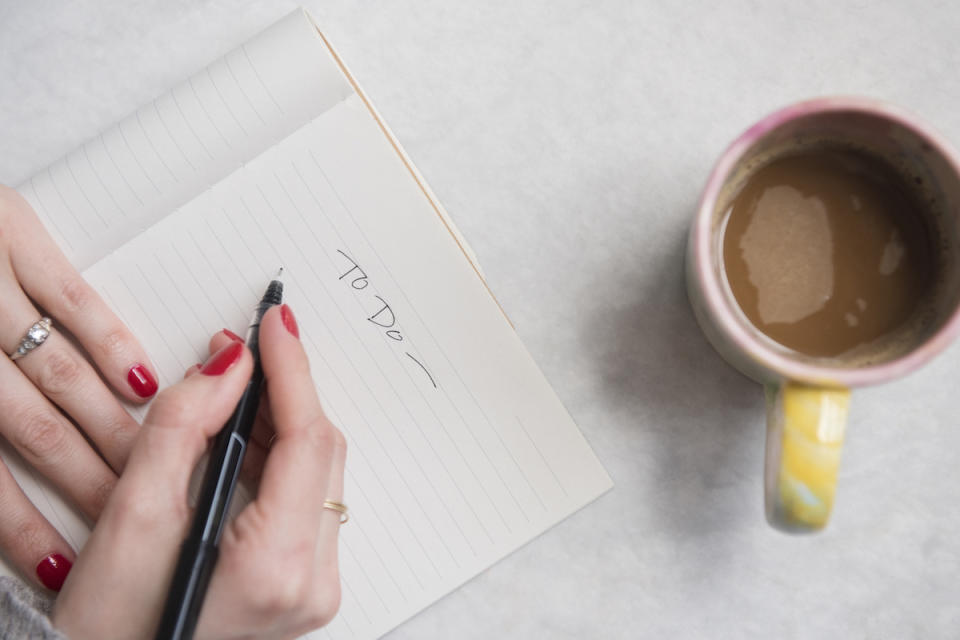How to Have More Energy — 6 Expert Tricks to Outsmart the 'Great Exhaustion'
With constant work obligations, personal to-dos and the generally stressful state of the world, it's no wonder you're exhausted, and you're not alone. In fact, experts have been calling the times we’re living in “The Great Exhaustion.” When you're exhausted, it's hard to envision a time when you might be back to your usual energetic self, and burnout can take a real toll on us mentally, physically and even spiritually. So, how to boost your energy? Luckily, there are simple strategies that will yield big results. We asked experts about smart ways to channel awareness and recharge effectively, so you can finally exhale and feel a lift.
How to have more energy: Tap awareness
1. Stop beating yourself up
The first thing to do when you feel exhausted? Just breathe, encourages Brigid Schulte, director of the Better Life Lab and author of Overwhelmed: Work, Love, and Play When No One Has the Time. “Come back to your body and the present moment to disrupt the swirl of external and internal pressures — the tornado you feel like you’re in the middle of.”
This pause will give you much-needed clarity, she assures, adding that the next thing to do is release self-blame. “We live in world where we’re taught to believe that exhaustion or burnout is our fault, but all the research confirms is not a personal failing. It’s really our workloads that need to change, especially for women who also shoulder the majority of housework. It’s important to understand that what’s driving that overwhelm hides under the guise of personal responsibility, but it’s bigger than you are, and you’re not to blame.”
Related: How to Stop Taking Things Personally: 6 Expert Tips to Build Resilience

2. Listen to your body
“A lot of what we feel as overwhelm or burnout is actually energy misalignment,” says Laura Mae Martin, productivity expert and executive coach at Google and author of of Uptime: A Practical Guide to Personal Productivity and Wellbeing. She explains that it’s tremendously helpful to listen to your body’s natural rhythms and try to schedule more intense to-dos when you’re more energized and less taxing activities when your energy levels are at an ebb.
“I was working with a woman who was such a morning person, but when I asked her when she did most of her strategic thinking, she said at night,” she recalls. “Just making a small change, by ensuring she had two mornings a week on the calendar to do what she needed, made a huge difference and shifted her energy levels.”
In short, not all time slots on the calendar are created equal, she says. “Being as intentional as you can about when you do certain types of tasks can make a huge difference.”
Related: How to Stop Worrying About Things You Can’t Control: Experts Share Their 6 Best Tricks
3. Sneak in self-care
Years ago, when Meriam Boldewijn, caregiver advocate and author of Caregiver 2.0: From Burnout to Powerhouse, was caring for her husband who in the hospital for kidney failure, she was trying her best to conceal even a hint of vulnerability. But when a social worker asked how she was doing, that simple question opened a floodgate of long-suppressed tears, and she knew she had to make a change.
She says the trick is to have a few relaxing activities you can turn to before you get exhausted. “I love to dance, for example — I don’t mean a simple side-step, I’m talking about shaking what my mama gave me!” Doing that for just five minutes helps her find an energizing sense of freedom.
“When you’re exhausted, especially as a caregiver, you’re at the crossroads of frustration and acceptance, and joy comes not from mourning what we’ve lost but acknowledging what we have.”

How to have more energy: Recharge fast
1. Set friendly limits
We’ve all heard that “No” is a complete sentence. But in the real world, it’s hard to be so brusque. A better way to create boundaries that will protect your time and energy is by leading with the positive, says Martin, a self-described recovering “say yes-er.”
“If you’re asked to take a meeting or do a task after work hours, for example, instead of saying, ‘I don’t take meetings after 5 p.m., you might instead say, ‘I take meetings from 8 a.m. to 5 p.m., and I’d love to meet with you at 4 p.m. Or if someone wants to meet when an email will do, you might say, ‘Hey, do you mind if I answer this via email — happy to meet, if needed!”
This is what Martin calls having a “friendly shark mentality” — you’re protecting your time and energy, but you’re doing so kindly and graciously.
Related: Experts: Saying ‘Sorry’ Too Much Is Holding Women Back — Here’s What to Say Instead
2. Celebrate just one to-do
With so much outside of our control, it’s a fallacy that we can fully manage our time — but what we can do is manage our expectations, declares Schulte. “My to-do list used to be 72 items long,” she says with a laugh. “But now I write everything out in one big brain dump. Then from that list, I pick just one task that if I complete, I can say the day was a success.”
She says instead of putting pressure on yourself to go-go-go, be-be-be, this allows you to celebrate small wins, lifting your mood and energy levels.

3. Reach out for support
In the end, it takes a village to alleviate exhaustion and give you the energy boost you need. When Boldewijn promised herself that she would never return to “Burnout City,” for example, she knew she had to begin delegating caregiving tasks.
“I would tell a friend, ‘You’re great at cooking; can you cook a meal this week? Or, if a loved one could go to the hospital that day, it meant I didn’t have to, and I could take a break. That’s how I began taking care of my health again.” Oftentimes, giving yourself permission to lean on the people who love you and who want to help is the fastest way to boost your energy.

